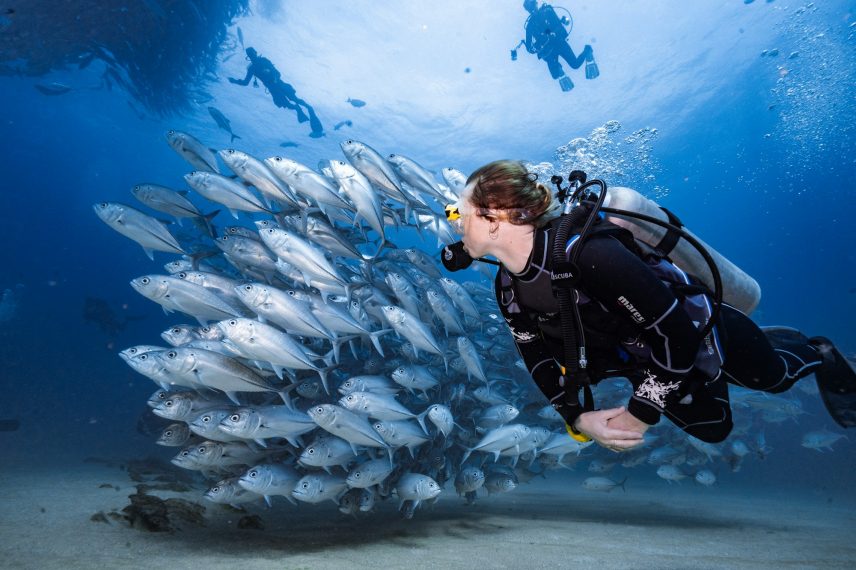Whether you’re a beginner, an expert or you just love the thrill of the ocean, scuba diving is a great sport that everyone can enjoy. But before you take the plunge, there are a few things you need to know.
Equipment
Having the right equipment for scuba diving is essential. Not only does it make you more comfortable underwater, but it also makes you safer. There are many different types of scuba diving equipment, so make sure you choose the best.
Buying your own equipment can save you money in the long run. You will have access to the equipment you need when you need it. You will also have better confidence and you will know that you are prepared.
There are many different types of diving equipment, and you can mix and match different pieces. For example, you might want to buy a dive computer, but you might also need a dive compass. You might also need a dive flag or a surface marker buoy (SMB).
A dive computer is a small electronic device worn on the wrist that tracks the depth of your dive. It also monitors the water temperature and air pressure. It can also calculate decompression stops and track your dive time.
Safety precautions
Using the right gear and following safety precautions can reduce your chances of an accident while diving. These rules are simple to follow and can help you have fun while you are underwater.
It is important to check your gear before and after each dive. Check the dive gauge to make sure there is adequate air in your tank. In the event that you run out of air at depth, make an emergency ascent.
It is also important to take the proper amount of weight. Too much weight can cause back problems and affect buoyancy. You should also consider checking the integrated weights on your equipment.
To avoid lung injury, you should always breathe slowly and completely. This can also help you to avoid decompression sickness. Decompression sickness occurs when a diver comes up too quickly from a dive.
Health conditions and medication use can affect diving fitness
Medications and health conditions can affect diving fitness, especially if you are dealing with a chronic condition. While it may be possible to dive with these conditions, you need to consider them carefully. It is a good idea to speak with a doctor before you begin your dives, as he or she will be more knowledgeable about diving conditions.
A common health problem among divers is asthma. Asthma is an inflammatory disorder of the airways that can lead to decreased airflow. It can also lead to obstruction. Symptoms include shortness of breath, wheezing, cough, frothy sputum and chest pain. In some instances, asthma can be treated with medications.
Heart disease is another common health problem among divers. Cardiovascular conditions such as high blood pressure and heart disease are a significant factor in dive fatalities.
Recreational vs technical diving
Often, people get confused between recreational vs technical diving. The difference lies in the level of training, experience, and equipment used.
Unlike recreational diving, technical diving is more serious. The risk of injury, drowning, and death is higher. It is also more expensive. The equipment required is more expensive, and there are additional procedures beyond recreational diving.
Technical diving usually involves the use of different gas mixes for breathing. It also includes advanced decompression. These decompression stops are necessary to allow gases to be released slowly. This prevents nitrogen bubbles from forming and causing serious health problems.
Technical diving involves diving deeper, or into wrecks. It may also involve diving in caves. It is more expensive to buy the necessary equipment and special gases. It also requires a lot of planning and training.
Safety procedures during a dive
During a dive, divers are taught to use safety procedures to prevent injury. These procedures include proper entry, descent, and exit from the water. They also involve proper breathing gas use and the use of appropriate equipment.
Safety procedures during a dive include the use of hand signals, light signals, and rope signals. This is an important step in communicating with other divers underwater. In some parts of the world, these hand signals can be confusing, however.
Another good safety measure involves the use of an air gauge. The gauge is essential for pro divers. It should be checked regularly to ensure that you are safe to return to the surface.
A good safety procedure is to plan your dives to fit within your comfort zone. This means that you should avoid diving in areas that are unfamiliar to you. This can also mean that you should avoid a dive if you feel unwell or are otherwise uncomfortable.
